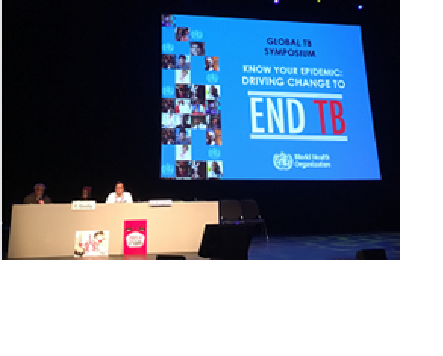
The second End TB Strategy Summit for National TB Programmes of the high TB burden countries* was held this week in Liverpool, United Kingdom. The aim was to identify top deliverables for 2017 in implementing the End TB Strategy, which aims to end TB by 2030.
The two-day summit brought together over 150 participants, including 24 National TB Programme Managers, civil society representatives, agency and technical partners and researchers. The meeting was convened by the WHO Global TB Programme with support from the US Agency for International Development, and the Governments of Korea and Japan.
The National TB Programme Managers shared their Ministry’s visions, objectives, steps planned towards ending TB and bottlenecks, through poster discussions. They then focused on three priority areas for ramping up the TB response next year: (a) Getting the most from TB data and analysis of patient pathways in accessing diagnosis and care; (b) Mobilizing domestic financing and multisectoral engagement, and (c) Enabling prioritized and integrated use of new diagnostics and drugs at scale.
Dr Mario Raviglione, Director of the WHO Global TB Programme, opened the meeting stating that “TB must be elevated to a higher political level both nationally and internationally to mobilize the commitment needed to end this epidemic. Without new funding, there will not be any new innovation. And without innovation, TB will continue to kill the most vulnerable.”
Dr Eric Goosby, UN Special Envoy on TB, presented ways to raise TB on the political agenda. “First countries need to obtain solid data on TB in order to get an accurate picture of their epidemic,” he said, “Then they need to translate the data and the unmet needs into a storyline to make a strong investment case to both their government and international donors.”
The National TB Programme Managers committed to build and promote investment cases within and beyond Ministries of Health, using their best data and the voices of civil society and those affected. They also agreed with partners to urgently overcome bottlenecks for the further roll-out of Xpert MTB/RIF to increase case detection, first- and second-line line-probe assays to identify resistance, new drugs to treat multidrug-resistant TB (MDR-TB) – bedaquiline and delaminid - as well as the shorter MDR-TB regimen.
“To mobilize engagement we need to work together: different arms of government, different ministries, the local business community, parliamentarians and civil society,” said Dr Enos Masini, Kenya’s National TB Programme Manager and Dr Abedola Lawanson, Nigeria’s National TB Programme Manager. They together reported on the Summit’s results at the WHO Global TB Symposium held yesterday, 25 October, a pre-event at the 47th World Lung Health Conference.
Civil society engagement was central to discussions of the Summit. Participants agreed that civil society can help drive high-level commitments and accountability, and that they must participate in all stages of the TB response – from planning, to delivery of care, to monitoring & evaluation and to outreach across sectors. “We are there to help you leave no one behind and end TB,” said Oluseyi Oyebisi, a TB advocate in Nigeria and member of WHO’s newly formed Civil Society Task Force on TB. “Now is the time for all of us to work together. We must walk the talk as one family.”
WHO Global TB Symposium
The annual WHO Global TB Symposium was held yesterday as a pre-event of the Union World Conference on Lung Health. The day-long meeting focused on three key themes - Know your epidemic; Driving political commitment and accountability; and, Advances in TB research and roll-out of innovations. The speakers included government officials and TB programme managers, global agency representatives, parliamentary and civil society leaders and advocates, technical partners, researchers and product developers.
*The 30 high TB burden countries are: Angola, Bangladesh, Brazil, Cambodia, China, Central African Republic, Congo, Democratic People’s Republic of Korea, Democratic Republic of the Congo, Ethiopia, India, Indonesia, Kenya, Lesotho, Liberia, Mozambique, Myanmar, Namibia, Nigeria, Pakistan, Papua New Guinea, Philippines, Russian Federation, Sierra Leone, South Africa, Thailand, Viet Nam, United Republic of Tanzania, Zambia and Zimbabwe.
